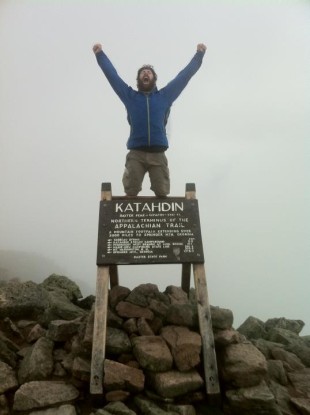Hikers spends months, sometimes years, preparing for their shot at thru-hiking the Appalachian Trail. They pour through hundreds of gear articles in hopes of cutting their pack weight down a few more ounces. They cook, dehydrate, pack, and ship dozens of priority mail boxes full of trail meals. They adopt strenuous workout regimens to brace their legs for the immense load of shouldering 20+ lb. up and down mountains all day, everyday.
Yet despite all this preparation, seven in ten of those who attempt a thru-hike fail.
Aspiring thru-hikers do everything they've been told is necessary to prepare themselves for a half year backpacking trip (unless your name is Jennifer Pharr Davis, then it's more like a month and a half), but unfortunately, they're doing it all wrong. They're training for a physical and logistical battle. But let's not mince words: thru-hiking the Appalachian Trail is a mental challenge.
How do I know?
In 2011, I attempted to thru-hike the Appalachian Trail. It was my first backpacking trip. Of any distance. Ever. I learned how to pitch a tent only a few days prior to embarking. My first attempt at operating my JetBoil wasn't until my first night on Trail (and unsuccessfully so- for those keeping score at home). Yes I'm serious (and also a little stupid).
Here's the kicker: I finished. I joined the exclusive minority of hikers who traverse the full 2,180+ mile length of the Trail.
How did I do it?

I trained my brain. Although I knew next to nothing about the contents of my pack, I set foot onto Springer Mountain having mastered the manual for the gear between my ears. I was equal parts ignorant and insistent.
And although many of those who finish the Trail do so by gritting their teeth and marching to the tune of their own misery, I was able to keep a positive mindset throughout my journey- even after contracting West Nile virus (again, I'm serious).
So how does one train their brain for a successful and happy thru-hike? I thought you'd never ask.
3 Ways to Train Your Brain for the Appalachian Trail
1) Knowing Your Why
In all honesty, this tactic should be #1, 2, and 3- it's that important. Although other methods will utilize our extrinsic motivators, an intrinsic drive is what allows us to actually enjoy the experience. Remember, gritting your teeth is admirable, but to truly master the mental game, we want as many of those 5 million steps as possible to be lead with a smile.
To know your why is to know your purpose. It's a snapshot into the emotional state of what brought you onto the Trail in the first place. When caught doing a light jog through a hail storm in hopes of avoiding hypothermia, it becomes a bit easier to forget why you've subjected yourself to such an endeavor. Instead of being at the mercy of these volatile emotions, it's important to arm yourself with a solid foundation.
We'll accomplish this by writing (not just thinking or saying) the reasons you're thru-hike the Appalachian Trail- broken down into three distinct lists:
- I am thru-hiking the Appalachian Trail because... (this is your why)
- When I successfully thru-hike the Appalachian Trail, I will... (these are the personal benefits you'll acquire upon reaching Katahdin)
- If I give up on the Appalachian Trail, I will... (these are the negative perceptions you'll develop of yourself if you quit - harsh but effective)
I encourage hikers to spend at least 10-15 minutes on each of these lists. Half assing this part is as good as bypassing the exercise altogether. It's important that we tap into the uncomfortable and deep seated emotions behind why you're hiking in order to convince your future self as to why you cannot throw in the towel.
It may sound silly, but I've received dozens of emails from successful thru-hikers saying that their lists played a huge role in achieving their goal. If you take one thing away from this article, let it be this. It works, trust me.
2) Go Public
We've touched upon an intrinsic motivator, now let's utilize the power of our ego.
If you're serious about walking from Georgia to Maine- there is one fact that is undeniable: you are a badass! Few feats in life can compare with thru-hiking the Appalachian Trail. It's a physical accomplishment most cannot fathom. It's a rite of passage few voluntarily subject themselves to. You will be that guy/girl your friends, family, and neighbors talk about admirably.
But only if you let them. And you should.
Going public with your plans means that others will hold you accountable for your bold ambitions. If at any point along the Trail you want to back out, not only do you have to look yourself in the mirror, but you'll have a lot of people to answer to. This is a shame we'd go miles (approximately 2,200) to avoid.
Use this social pressure in your favor! Tell your friends and family. Tell your colleagues, classmates, cribbage club, and chiropractor. Tell the Internet. Tell strangers. Tell pets. Tell anyone or anything willing to listen.
It wasn't until I announced that I was going to thru-hike the Appalachian Trail on my website that I took this daunting task seriously. All of a sudden the pressure became much more intense, and although it was difficult, I'm glad I pushed myself off that cliff. So will you.
3) Visualize Success
Even though Appalachian Trials offers more than 150 pages worth of tips on mentally preparing for a thru-hike, I wanted to present one tactic not included in the book.
I refer to visualizing success.
In the weeks leading up to the trail, I lost much sleep due to elaborate visualizations of what my new life would look like- and more importantly- how I would react. I envisioned myself going through the motions all the way to the point of summitting Katahdin.

And although some literature (e.g. The Secret) has received a bad rap for its fantastical representation on the power of visualization, it's not voodoo or hocus pocus. There's good science to support it's effectiveness. It's a strategy used by world class athletes such as Tiger Woods, Michael Jordan, and Michael Phelps.
“Everything you can imagine is real.” – Pablo Picasso
If you're serious about your goal, envision it. Picture your journey down to the finest detail. Imagine the soft wet ground beneath your tent as you try to fall asleep. Imagine walking through a densely packed forest with nothing but white blazes guiding your way. Imagine each step of the process all the way to your final ascent of Mt. Katahdin. When doing so, combine this tactic with the person you will become upon achieving your goal (see: tip #1).
Finding your why, utilizing social pressures, and visualizing your success might not be conventional forms of preparing for a half year backpacking trip, but convention currently results in a 70% failure rate. Dare to be different. Dare to succeed.
Zach Davis is an Appalachian Trail thru-hiker, bearded adventurer, and author of Appalachian Trials: A Psychological and Emotional Guide to Successfully Thru-Hiking the Appalachian Trail. His current passion has him as the Managing Editor at Appalachian Trials (the website), a community of Appalachian Trail enthusiasts. You can find him on Facebook, Twitter, and Google.







Comments
hunter moss
March 26, 2014 - 8:28pm
great article!!! thanks so much for sharing! thinking about taking a long walk myself this year and this will def. help!
Bruce Bailey
March 26, 2014 - 9:01pm
Very good article!
Steve Jennette
March 27, 2014 - 9:24am
Jennifer, Have both your books, love them. Hope your travels are not wearing you out. I also read Mr Davis' book before my 2013 thru-hike. Above, and in his book, he says he "traversed" the entire 2,180 mile AT in 2011, by which I assume he implies he actually "thru-hiked" the AT that year. Later in his book, however, in discussing "hike your own hike", Mr Davis acknowledges he skipped a section of the Trail in his attempt at a thru hike, and instead took a rafting trip thru 100 miles of the Shennandoah National Park. The latest addition of the ATC Magazine discusses what constitutes a "thru hike", in a great article urging "alternatives" to the highly popular NOBO, but whatever direction(s) one chooses to navigate the Trail in a thru hike, there is no ambiguity in the requirement that to be considered a thru hiker, one must HIKE the entire Trail. Rafting is not hiking. My guess is you will not post this comment, not wanting controversy on your blog, and I understand if you make that decision....and am not the least offended. This is your blog. I just know that you rightfully take pride in your thru hike records (which I applaud), and I am sure you would not think you held the record for a thru hike of the AT if a friend had given you a car ride for 100 miles of a boring or difficult part. I think Mr Davis' advice is very sound, and enjoyed his book....but I think he should not call himself a thru hiker. It is disrespectful to those of us who met the ATC's definitional requirement of a thru hiker. I enjoy your FB posts, and your blog very much. Continued good luck with book sales and your hiking company. You are a true asset to the AT, the fitness community, and hiking in general.
Jennifer
April 4, 2014 - 4:07pm
I have NO problem with your thoughts and reply. Thank you for the feedback! Sorry I didn't post it on the blog sooner ; )
casey weeks
April 27, 2014 - 10:57pm
im really past due on finally achieving something in my life..i think im going to ease on down the trail once i save enough to buy exactly what i need for the journey... my goal is to finish this endeavor, and seriously think about life from every perspective possible while being sober..im goin in on my own and i will finish...
Rob
May 26, 2014 - 10:18pm
As for those three points, I agree that you definitely need to know why you're doing the hike, and be committed to it.
The science of psychology, however, shows us that things like "going public" and "visualizing your success" are actually counterproductive. When you go public and/or visualize your success your brain releases dopamine as if you had *already done* the thing you're going to do. Talk to enough people about the hard thing you're going to do and you'll probably lose interest in doing it, because you've gotten a lot of the reward (i.e. happy drugs in your brain) without any of the effort. You're better off being sure you want to do the hike, doing it, and *then* telling everyone about what you *did*.
Zach
June 23, 2014 - 6:11pm
Rob, yes, talking about the achievement of a goal will result in dopamine, but if we're talking science, please show me *one* piece of scientific literature that demonstrates a temporary release of dopamine preventing someone from following through with their goals.
Sheila Geary
January 18, 2015 - 3:57am
Excellent advice. Have you any knowledge of or experience with hiking the Pilgrim Path in Ireland?
Laura
January 21, 2015 - 6:29pm
Yes!!! I'm attempting a thru-hike this summer at what seems like the same level of preparation and determination as you. This reinforces my desire more than you can imagine. Thank you for writing this, I'm going to read it 100 times before I depart. xoxo
Leah Rinaldi
February 18, 2015 - 9:48pm
Thank you so much for sharing your thoughts. I have jotted down the main points and am going to thoroughly answer and reflect on what you said and what my thoughts. feelings and goals are. I would love to discuss further with you to talk about your physical endurance and struggle from being away from home and what you ultimately learned from finishing the trail. Really looking forward to hearing from you.
Talk soon,
Leah.
Zak Pramik
February 24, 2015 - 4:16am
What a wonderful motivating article in preparation for my thru-hike! One piece of advice that I would add on to this -
Make a list of potential scenarios that may force you to quit the trail. Then, write how you will approach each scenario.
Thanks for sharing! Happy hiking...
Rob Sparger
March 13, 2015 - 6:19am
My why is simple. I've had three total shoulder replacements all before the age of 40 yrs old. Life has knocked me down more times then I like to count. So hiking the AT is showing others and more importantly myself that I'm stronger than what we think beyond measure. My inner strength and heart will carry me when my heart and my limbs are too tired.
Emily
July 7, 2015 - 2:51pm
First, this is one of my favorite articles I've read about hiking the AT. So, thank you for that.
Second, were you in good shape at all when you did the thru-hike? Or did that matter at all?
Wanda Engelhardt
September 8, 2015 - 4:20pm
What you are talking about works. It is how me a double mom of 3 and no high school education got through nursing school. I'm 52 now menopausal and feel very confused and unaccomplished. I've rarely really finish anything I've started. Slept one night in a tent at a camp ground. But for some reason since living near part of the trail in PA and spending a week in NH. hiking the AT is something I know I can do and should do. Thanks for a great article.
jerry keer
August 16, 2016 - 3:54pm
I enjoyed all your comments. I have been thinking about a through hike for almost a decade now...really it gnaws at me so much that I know the trail is calling me. I hope to hike it in 2017, but 2018 at the latest. I am 48 years old now, 50 may be the magic number. I f any one is planning to do a through hike in the nest two years feel free to email me. As of now I am fairly certain I will be on my own, Id like to have someone one some people to hike with....I think LOL